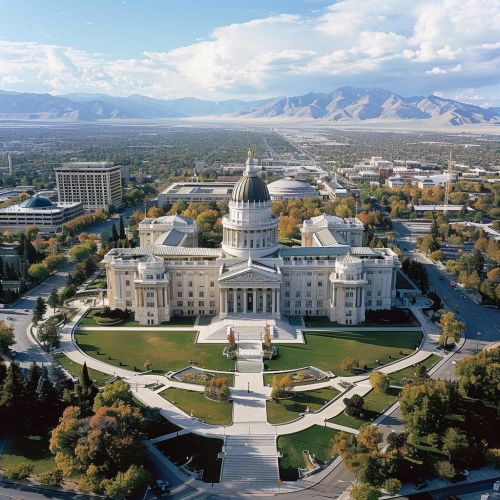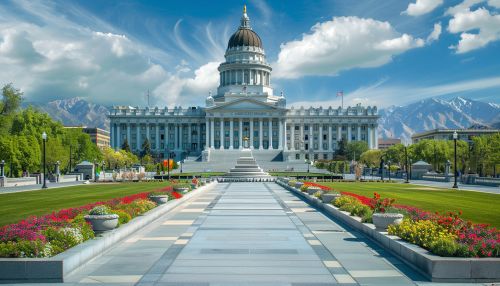Jon Huntsman Jr.
Early Life and Education
Jon Meade Huntsman Jr. was born on March 26, 1960, in Redwood City, California. He is the son of Jon Huntsman Sr., a prominent businessman and philanthropist, and Karen Haight Huntsman. Huntsman Jr. was raised in a family with deep roots in Mormonism, which played a significant role in shaping his early life and values.
Huntsman attended Highland High School in Salt Lake City, Utah, where he was an active student, participating in various extracurricular activities. He later enrolled at the University of Utah but left before completing his degree to serve as a Mormon missionary in Taiwan. This experience not only deepened his religious convictions but also provided him with a profound understanding of Chinese culture and language.
Upon returning to the United States, Huntsman completed his undergraduate studies at the University of Pennsylvania, earning a Bachelor of Arts degree in International Politics from the Wharton School of Business in 1987.
Early Career
Huntsman's career in public service began in the Reagan administration, where he worked as a staff assistant in the White House. His proficiency in Mandarin Chinese and his understanding of Asian cultures led to his appointment as Deputy Assistant Secretary of Commerce for East Asian and Pacific Affairs under President George H.W. Bush. In this role, Huntsman was instrumental in shaping U.S. trade policy in the Asia-Pacific region.
In 1992, Huntsman was appointed U.S. Ambassador to Singapore by President George H.W. Bush, making him the youngest American ambassador in over a century. During his tenure, he focused on strengthening economic and security ties between the United States and Singapore.
Governorship of Utah


Huntsman was elected as the 16th Governor of Utah in 2004 and was re-elected in 2008 with a significant majority. As governor, Huntsman prioritized economic development, education reform, and healthcare. He implemented policies that led to substantial job growth and positioned Utah as one of the best states for business.
Huntsman was also a proponent of environmental sustainability. He supported renewable energy initiatives and worked towards reducing greenhouse gas emissions. His moderate stance on various issues, including his support for civil unions for same-sex couples, garnered him bipartisan support.
Ambassador to China
In 2009, President Barack Obama nominated Huntsman to serve as the U.S. Ambassador to China. His nomination was unanimously confirmed by the Senate. Huntsman's tenure as ambassador was marked by efforts to strengthen U.S.-China relations amidst growing economic and geopolitical tensions. He played a crucial role in facilitating dialogue on issues such as trade imbalances, human rights, and regional security.
Huntsman's deep understanding of Chinese culture and language allowed him to engage effectively with Chinese leaders and the public. His diplomatic efforts were aimed at fostering mutual respect and cooperation between the two nations.
2012 Presidential Campaign
In 2011, Huntsman resigned from his ambassadorship to China and announced his candidacy for the Republican nomination for President of the United States in the 2012 election. His campaign emphasized fiscal conservatism, foreign policy expertise, and a pragmatic approach to governance.
Despite his credentials and experience, Huntsman struggled to gain traction in a crowded Republican field. His moderate positions on social issues and his willingness to work across party lines were viewed unfavorably by some conservative voters. He ultimately suspended his campaign in January 2012 and endorsed Mitt Romney.
Later Career and Public Service
After his presidential campaign, Huntsman continued to be active in public service and international affairs. He served as the Chairman of the Atlantic Council, a prominent think tank focused on international relations and security. In this role, he advocated for a strong transatlantic alliance and addressed global challenges such as cybersecurity and climate change.
In 2017, President Donald Trump nominated Huntsman to serve as the U.S. Ambassador to Russia. His nomination was confirmed by the Senate, and he assumed the role during a period of heightened tensions between the United States and Russia. Huntsman focused on addressing issues such as election interference, arms control, and regional conflicts.
Personal Life
Huntsman married Mary Kaye Cooper in 1983, and the couple has seven children, including two adopted daughters from China and India. The Huntsman family is known for their philanthropic efforts, particularly in the areas of cancer research and education.
Huntsman is an avid musician and enjoys playing the piano and guitar. He has also been involved in various charitable organizations and initiatives, reflecting his commitment to public service and community development.
Legacy and Impact
Jon Huntsman Jr.'s career is marked by his dedication to public service, diplomacy, and bipartisan cooperation. His contributions to U.S. foreign policy, particularly in Asia, and his efforts to promote economic development and environmental sustainability in Utah have left a lasting impact.
Huntsman's pragmatic approach to governance and his ability to navigate complex international issues have earned him respect across the political spectrum. His legacy is one of service, diplomacy, and a commitment to fostering understanding and cooperation in an increasingly interconnected world.
